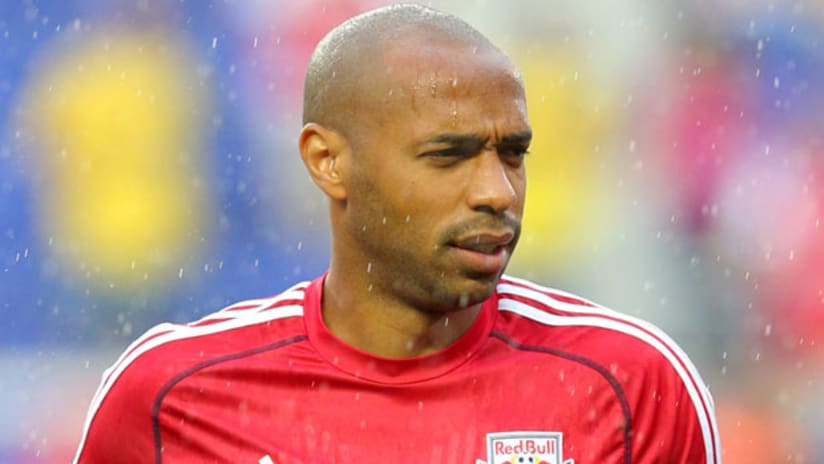What made Thierry Henry so special?
Most people would attempt to answer this by cueing up footage from his long, consistently brilliant highlight reels, and with good reason. But the 24 seconds of footage that amount to his final remarks in a New York Red Bulls uniform – four words uttered to the media in the Gillette Stadium visitors' locker room on Saturday before he strode off, both literally and figuratively, with his customary understated swagger – offer a profound legacy of their own.
As infuriating as those kind of stunts can be for stressed reporters working on tight deadlines, in a sense Henry was providing a unique, even stunning eulogy to the team that had just beaten his, by an exceedingly narrow margin, over the two legs of the Eastern Conference Championship.
Henry scored 51 MLS goals and helped create 42 more, many of them truly spectacular and nearly all of them finely, cunningly crafted. He hauled a star-crossed club from league punching bag to perennial contender status, securing a Supporters' Shield and making playoff runs the rule rather than the exception in New York. He drove everyone around him – not only those in his club's colors, but adversaries, too – to be better, tougher, more demanding and less complacent.
But he never got to lift the league's top trophy, and his irritation with that was clear as he gave that terse tip of the cap to the Revolution. An MLS Cup title is perhaps the one thing that other MLS titans of his class - icons like David Beckham, Robbie Keane, Guillermo Barros Schelotto, Marco Etcheverry and Landon Donovan - have achieved that he could not. And it's unlikely that he'll forget that harsh fact any time soon.
It surely wasn't for lack of trying. Despite whispers to that effect on both sides of the Atlantic, Henry was neither washed-up nor burned-out when he moved from mighty FC Barcelona to brand-new Red Bull Arena in 2010. Now 37, he's proved as much with four-and-a-half sterling seasons that showcased the full range of both his singular talents and the mercurial personality that drove them.
Sure, he elected not to play on a few artificial-turf fields that he considered risky to his chronic Achilles issues, drawing more than a few barbs in response from opposing fans. But he hardly ever gave himself or his teammates any other kind of break. No one was safe from his baleful glare or sharp tongue if they made a mistake, and even his own goals were typically not cause for celebration unless it had reached what he considered a worthy level of virtuosity.
“Titi” had dreamed of living in the Big Apple for years, and it apparently took years for player and club to settle on the Designated Player contract that finally lured him away from the sport's very highest echelons. But he wasn't here on vacation. There would be no dalliances with moneyed suitors keen to lure him back to Europe – though he made sure to keep himself fit most winters by visiting his beloved former (and perhaps future?) home at Arsenal in north London.
As it's been said in many spaces, Henry brought “world class” to RBNY and MLS. But he made us aware of the true depth and breadth of that term in a way that few others ever had. Henry showed us that it means being not merely an elite performer, fierce competitor and unrelenting worker, but also a restless perfectionist, exacting colleague and true soccer intellectual.
Now that the existential fears of its early years have by and large receded into the distance, MLS finds itself facing a more unusual challenge – the tension between the standard ways of running a professional sports franchise in the United States and Canada vs. the distinct modus operandi of leading soccer leagues around the world.
Matching up to the latter – which some more succinctly dub the “global standard” – is a different sort of task than elbowing out a space on the crowded domestic sports landscape against the NFL or Major League Baseball.
The beautiful game's long-sought escape from North American isolationism forces MLS – and by extension, the two nations it calls home – to compete on an even tougher playing field. And with all the finely-honed timing you'd expect from him, Thierry Henry swooped in to explain to us, with thoughts, words and actions, just how tall that task really is. He helped the league, but like with everything else he did while he was here, he ultimately challenged MLS to be better.
It might be difficult for MLS to ever produce a marketing icon on the scale of Beckham. But maybe that shouldn't be the goal.
If Canada or the US truly want to reach the top levels of world soccer, we'd do well to try our hardest to grow an epochal player like Henry.














